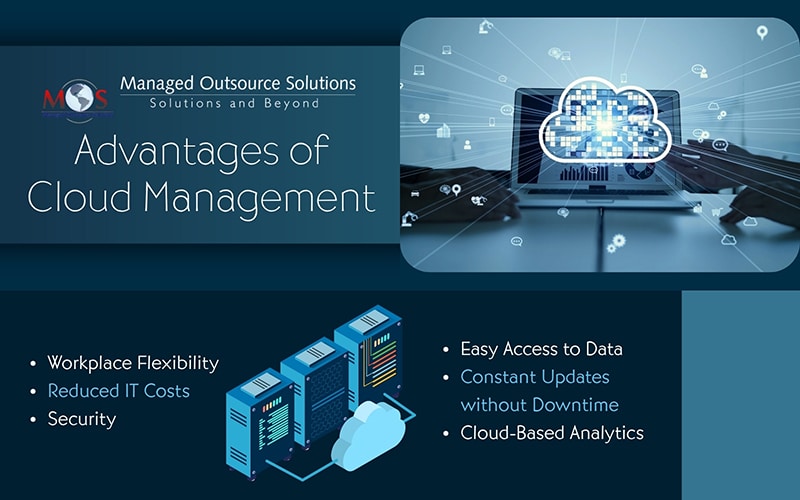While companies have been implementing cloud-based systems for various aspects of their business for a few years now, the pandemic accelerated adoption. The cloud-based management system has proven especially useful in helping businesses streamline operations, improve accessibility, and secure data. While they offer plenty of advantages, migrating to a fully cloud-based system can be a challenge. That’s where leveraging outsourced solutions can prove useful.
Choosing the Right Cloud Service Provider – Key Considerations
Implementing a cloud based document management system involves several steps and expert support can support a smooth transition. In fact, the level of support offered by a cloud service provider can determine the success of the migration. It is also important to consider the advantages in terms of ROI:
- When implementing the new cloud software, it should help increase productivity of your business and its earnings. For that, the cloud system must ensure easy availability of documents.
- The data must be secure, yet available for authorized personnel to access. For that, we need electronic signature capabilities and built-in workflows so that lengthy periods of time aren’t spent on scanning, filing and routing documents.
- Ultimately, you should be able to reduce the costs your business would otherwise incur on onsite server storage. You shouldn’t have to spend your company’s hardware resources to store documents.
So, get quotes from various providers and compare them to figure out the most cost-effective but efficient means of cloud migration. Experienced document management providers could also provide you customized packages suited to your requirements. Of course, you need to spend time on discussing plans and packages with various providers, ask around for opinions and views about these providers, and then select your cloud migration partner. That increases your chances of success.
It isn’t just in the initial adoption of the cloud, you also need constant support whenever needed, so that the normal functioning of the business isn’t affected by technical issues. The cloud services provider must be able to ensure that.
Advantages of Cloud Management
We know cloud management is ultimately beneficial, but let’s get into its specific advantages:
- Workplace Flexibility: One of the greatest cloud computing benefits is the easy access to multiple platforms and data. This is particularly beneficial when employees are working from various physical locations or from home. With remote access technology, you can put work-from-home measures into place when the situation demands. If employees are required to travel, they can access the files from their laptops, tablets or even smartphones. This also helps when you have outsourced staff working for you.
- Reduced IT Costs: The other big advantage of taking documents to the cloud is the reduced IT costs. Maintaining infrastructure for effective document management and file storage can be expensive, not only in terms of hardware resources but also employee costs. With outsourcing, you can save a great deal with competitively priced service subscriptions. Cloud services make use of huge server farms, potentially cutting your company’s resource load by up to half.
- Security: Data security is an advantage you just can’t ignore. The security advantages of cloud-based management software include robust encryption protocols and constant monitoring. Data hacking costs businesses in the US billions of dollars annually. Cloud services have sophisticated security measures in place. They have taken significant steps for it because, let’s face it, storing files on the cloud doesn’t sound very reassuring in terms of security. That’s why cloud services maintain dedicated teams to monitor network activity. With their sole task being managing security, all their efforts are channeled towards it.
That’s a different situation from where an organization has to monitor everything in-house. Its resources are divided and it couldn’t possibly manage everything on its own. That’s where security lapses occur. There is also the threat of internal theft of data that many organizations face. Many employees indulge in such activities, and storing data on the cloud therefore makes data much safer than storing in internal company servers. Back in 2015, a Rapid Scale study reported that 94% of organizations saw security improve after they turned to the cloud.
- Easy Access to Data: Easy but secure access to data by authorized personnel helps in backup and recovery of data. You never know when an emergency could strike. You don’t want data to be lost when server repairs or damages occur. There could be internal issues or even environmental catastrophes that destroy buildings, facilities and server hardware. Cloud data storage ensures you never lose access to important files.
Cloud services perform regular data backups. These periodic backups of client data ensure that these documents can be retrieved whenever required. So, when any data disruption occurs, you know your files can be recovered from the cloud storage. Improved data accessibility through cloud-based platforms allows for real-time collaboration, secure storage, and easy retrieval of critical information from anywhere.
- Constant Updates Without Downtime: Cloud systems are constantly updated by the providers, which improves document access. If businesses were to keep updating their servers and other in-house technologies, you know that it would bring about significant downtime. You could avoid that downtime as the cloud system will do the updating for you. These periodic updates iron out niggles and increase the security capability of the cloud system. New features also get added.
- Cloud-Based Analytics: Businesses don’t just have data regarding their day-to-day functioning. They also have market research data gathered from customers, competitors and the market experts. There are actionable insights these bits of data contain that can help:
- improve the services businesses offer customers
- decide the kind of products or services that should be launched in the future to better serve customers
- streamline business functioning and optimize the way they work
- get one step ahead of the competition
The actionable data stored in the cloud can help you plan for the future, because that data is safe, easily accessible and backed up. That’s where signing up with the right cloud services provider helps. Advanced and client-friendly cloud document management providers provide integrated analytics solutions to generate customized reports and implement tracking mechanisms to make better sense of all that data. Salesforce reported that Sunny Delight, the beverage company, was able to save a massive $195,000 in staffing and thereby raise profits by around $2 million per year through insights gained by cloud-based data analytics.
Outsourced solutions not only simplify the transition to a cloud-based management system but also support long-term operational efficiency, cost reduction, and data-driven business strategies. Choosing the right provider is key to maximizing these benefits and staying ahead in today’s competitive landscape.





